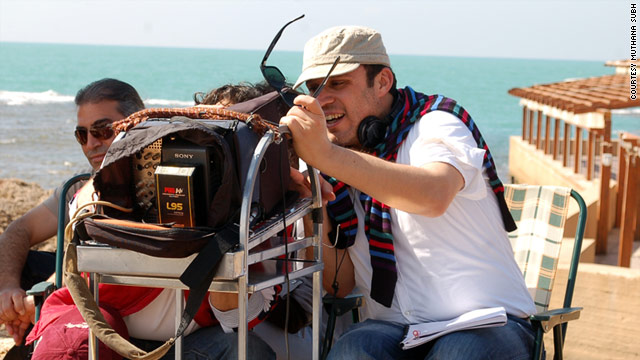 |
| The filming of the Syrian drama "Jalasat Nesaiya" and many other Ramadan series were uninterrupted by unrest, but the Egyptian revolution affected production there. |
(CNN) -- Egyptian Gabriel Khoury's first foray into television drama "Dawaran Chobra" is being watched by millions on four channels every night during the holy month of Ramadan.
A time of fasting and prayer for Muslims, Ramadan is also peak television viewing season, much like Christmas in the U.S., and Egypt has long been the region's leading producer.
Movie producer Khoury had planned to make two series for this Ramadan, but the other had to be postponed until next year because several members of his team were too busy participating in the revolution to work on it.
It was not the only production to be be dropped because of the revolution: The number of drama series produced for Ramadan this year dropped from more than 50 last year to 32 this year, according to Egyptian newspaper AlMasry AlYoum.
A tradition has developed in recent years for families to watch television dramas together each evening after breaking fast.
According to figures for the first two weeks of Ramadan 2011 from market researchers IPSOS, TV viewership jumped up across the Middle East -- a significant proportion of that increase coming from Ramadan series.
In Egypt, so far, for example, viewership increased by 30% -- also affected by big audiences for the televised appearances of former president Hosni Mubarak and his sons in court on criminal charges following the January revolution.
"Television production companies work throughout the year to put out their best drama during that period," said Nabil Dajani, professor of media studies at the American University of Beirut.
"There will be 30 episodes covering every night of the month of Ramadan. It is a tradition that has developed over the last five or six years," he added.
Khoury's series "Dawaran Chobra" is about the co-existence of Coptic Christians and Muslims, and is currently being shown on three channels in Egypt and one in the Gulf.
"It's about ordinary Egyptians with ordinary problems done in a subdued and realistic way," said Khoury. "It doesn't shout over the roofs, but just shows some of the things they do together."
Khoury said in post-revolution Egypt there already seemed to be a backlash about big money paid to big stars.
"This year we have tried to break the mold with a good quality series without the big names," he said.
The other series planned by Khoury and his company Misr International Films -- an adaptation of the book "Zaat" by Egyptian author Sonallah Ibrahim -- will be produced for Ramadan next year.
The series follows the life of a woman from the Egyptian revolution of 1952 to the events of this year.
"It follows the family, but with all the political events of the last 60 years as a backdrop," said Khoury.
"Our scriptwriter Mariam Naoum and director Kamla Abu Zekri were both involved in the revolution so didn't have time to do it this year."
Dajani said the drop in production in Egypt was also caused by difficulty in gaining funding during the revolution.
Another big producer of Ramadan television dramas is Syria.
Despite violence and political uncertainty sweeping the country, Syria's production of Ramadan drama continued largely undisturbed in the capital Damascus.
Around 35 Syrian-made drama series are currently being shown across the Arab world.
Dajani said: "The Syrian unrest started much later, so by that time the programs were ready."
Muthana Subh, a prominent Syrian television director, currently has his drama series, "Jalasat Nesaiya," or Women Meet, being shown every night on six television channels across the Arab world.
"Some things are normal, some things are worrying," Subh said of the current situation in Damascus. "There are many moods, you can't know every mood."
Dajani said that Lebanon and the Gulf countries were also emerging as large producers of Ramadan drama, commonly known as "Ramadan soaps," but did not yet challenge the dominance of Syria and Egypt.
Badih Fattouh, Group Director of Content at MBC, a major broadcaster across the Arab world, said its top-rated flagship Ramadan program was a Saudi comedy "Tash18," the most successful ever to come out of the kingdom.
Fattouh agreed that Syria's prolific drama production had been largely unaffected by the unrest sweeping the country.
"The major events are still until now taking place outside the capital Damascus where most of the drama productions are currently taking place," he said.
Because most dramas take at least a year to produce, their content this year is largely unaffected by the political changes sweeping the region.
Fattouh said: "A few production companies introduced certain changes in their scripts to make them more relevant to (Egypt's) current post-revolution situation, while a few others chose topics dealing with nationalistic or patriotic matters."
However, the events of the past six months are likely to be reflected in next year's crop of Ramadan drama.
"I expect by next year we will see a completely different type of drama from Egypt," said Dajani.
"I think they will be much bolder in their criticism of the government and in dealing with the Palestinian problem. There is already a drama on Jerusalem that was delayed this year, but will be on air for next year."
Fattouh added that the emergence after the revolution of Egyptian private channels in search of new content would provide a good source of income for production companies.
No comments:
Post a Comment